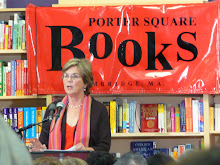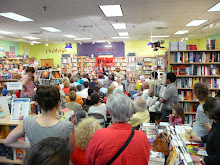Last night I took a trip into my past and gave a reading at the Swampscott Public Library in Swampscott Mass. The audience included classmates from high school, Paul Sherry and Helene Roos Hazlett, as well as a number of enthusiastic people who had already read the book and asked great questions. I told the story about how when I was in high school, my first job was working in that same library -- shelving books, repairing torn spines, replacing used up due date slips. (Someone asked if I had worked for Miss Snow or Miss Pollard. The answer is yes!)
Part of my library job was re-shelving books with a little red dot on the spine that had to go deep into special shelves in the basement where no teenager might find them (books like Ulysses, From Here to Eternity, Dreiser’s An American Tragedy). These “red dot books” had sexually explicit scenes and in the 1950s such books were for adults only. I learned to scan these books quickly before I returned them to the shelf. Then I told my friends which books they should ask their parents to take out for them. Of course their parents were thrilled that their children were interested in expanding their reading. (One woman in the audience said she had asked Mr. Hensahw, her English teacher, if she could do her book review on An American Tragedy because she had just seen the movie with Elizabeth Taylor and Montgomery Clift based on the book. (renamed “A Place in the Sun,” 1951). He said sure. Great. But when she went to the library to get the book, Miss Snow or Miss Pollard said, “We don’t have it. And we will never carry a book like that.”)
When I was growing up in Swampscott -- only eighteen miles north of Boston and named for the Squamscot Indians – it was still a town with a functioning fishing fleet, a huge old summer hotel (the New Ocean House) where people came with their trunks and stayed for the summer. From my high school home room, I could see the fishing boats leaving the morning from Fisherman’s Beach. The view I saw was mostly flat sea and part of Nahant. Boston had no skyline because it still had no skyscrapers. Consequently, the town was much more remote from urban Boston than mere miles would suggest.
Since then I’ve done research and worked in a lot of libraries, and today I have cards for half dozen libraries, but for the past twenty-six years the one I use most is the O’Neill Library on Rindge Avenue in North Cambridge a few blocks from where I live. “If libraries didn’t already exist,” commented my neighbor Rosemary, “they couldn’t be created. Imagine the conservative Republican backlash to the idea of creating an institution where people could borrow books and records and films and take them home FOR FREE?” We discussed the likely reaction of a few Newt Gingrich, neo-conservative, free market, libertarian thinkers to such a proposal.
Her point was so intriguing that I went home and looked up Andrew Carnegie, the originator of public libraries as we know them. Beginning in 1890, when most libraries were private or by subscription only, Carnegie, owner of Carnegie Steel (later U.S. Steel) financed, built and equipped over 2500 free libraries in 47 states. His only conditions were that the town donate the land and provide public funds for maintenance. His reasoning, however, was as creative as the idea. “It is the mind that makes the body rich,” he wrote. He believed in self-education of the common man (and woman, one hopes). He believed that the rich had a moral obligation to give away their fortunes. His philosophy of wealth was that private fortunes should be regarded as a public trust to benefit the community. “The man who dies rich dies disgraced,” was one of his frequently quoted remarks.
In that we seem to be in a new Gilded Age, it is worth remembering by the time he died in 1919, Carnegie had given away approximately $4.3 billion, in today’s dollars, had built libraries all over the English-speaking world, had created the investment fund for public school teachers that became TIAA-CREFF. He also commissioned a journalist to interview wealthy men and publish their secrets of wealth creation for an audience of average people. The resulting book How To Think and Grow Rich has never gone out of print.
Come to think of it, maybe I should go to the library and take that book out. Right now!
Wednesday, June 24, 2009
Subscribe to:
Post Comments (Atom)






No comments:
Post a Comment